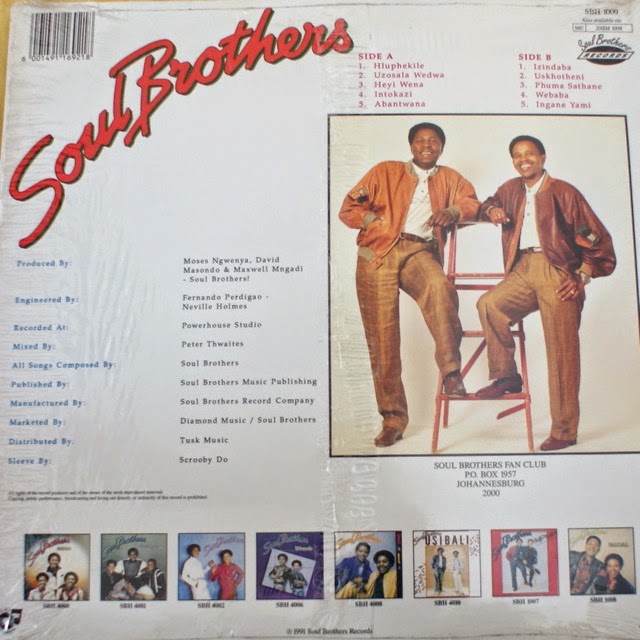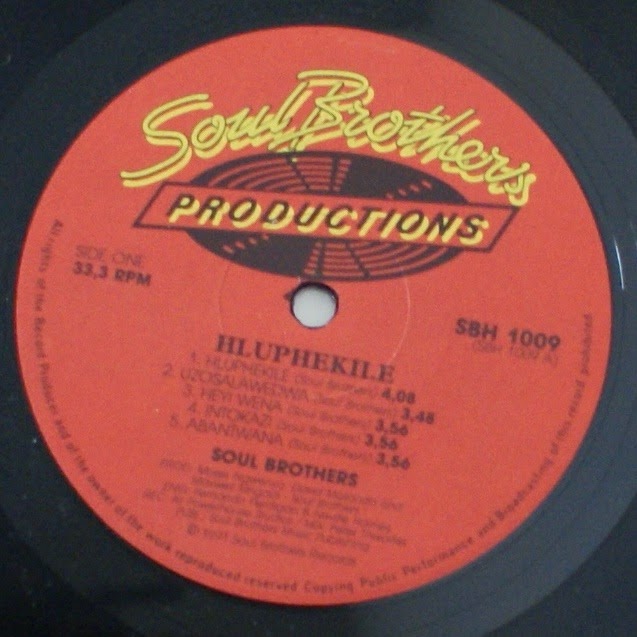5372 files 24.59Â GBfound 5 years ago
 Izigi-Umgxobanyawo
 AMY GRANT
 AMY GRANT - EVERY HEARTBEAT (7 BODY & SOUL MIX).mp3
 3.52 MB
 Happy Birthday
 hamba nhliziyo.mp3
 6.14 MB
 isigondela
 Soul Brothers - Track 1.mp3
 4.61 MB
 Soul Brothers
 HLUPHEKILE
 Soul Brothers - Hluphekile.mp3
 3.76 MB
 Isigcebhezani
 Soul Brothers - Amacala...Soul Brothers.mp3
 4.64 MB
3211 files 15.72Â GBfound 6 years ago
 Rough_Guides_[torrents.ru]
 1996 - The Rough Guide to Reggae
 06. KING TUBBY & THE SOUL SYNDICATE - GREAT STONE.mp3
 3.72 MB
 1996 - The Rough Guide to The Music of South Africa (First Edition)
 12. SOUL BROTHERS - UDLAME.mp3
 5.40 MB
 1996 - The Rough Guide to The Music of Zimbabwe
 03. THE FOUR BROTHERS - VIMBAYI.mp3
 11.50 MB
 2001 - The Rough Guide to The Music of Brothers
 10. SOUL BROTHERS - HLUPHEKILE.mp3
 4.33 MB
 2003 - The Rough Guide to South Africa Gospel
 06. MICHAEL NKOLE & HIS APOSTLES - HAMBA JONA.mp3
 3.93 MB

ngisize mama mp3 fakaza
. This is the official music video for Hluphekile by the Soul Brothers. The song is from the album of the same title, which was released in 1991._____Follo.. Soul Brothers - Hluphekile - YouTube. Soul brothers- 10 years later I uploaded! Thanks to Covid!. Hluphekile - Soul Brothers | Shazam. Soul Brothers - Hluphekile (Official Music Video) Featured In Album Hluphekile Soul Brothers Play full songs with Apple Music. Get up to 3 months free Try Now Top Songs By Soul Brothers Buya Mama Wami Soul Brothers Mama Ka SBongile Soul Brothers Hluphekile Soul Brothers Ushaywa Njalo Soul Brothers Akabongi Soul Brothers Thandaza Soul Brothers. soul brothers-hluphekile - YouTube. About Press Copyright Contact us Creators Advertise Developers Terms Privacy Policy & Safety How YouTube works Test new features NFL Sunday Ticket Press Copyright .. ‎Hluphekile by Soul Brothers on Apple Music. Hluphekile Soul Brothers R&B/Soul · 1991 Preview Abantwana 1 3:53 Heyi Wena 2 3:57 Hluphekile 3 4:05 Ingane Yami 4 3:51 Intokazi 5 3:55 Izindaba 6 4:32 Phuma Sathane 7 4:17 Uskhotheni 8 3:39 Uzosala Wedwa 9 3:44 Webaba 10 3:36 November 18, 1991 10 Songs, 39 minutes ℗ 1991 Gallo Record Company More by Soul Brothers Jive Explosion. Soul Brothers: albums, songs, playlists | Listen on Deezer soul brothers hamba hluphekile. Hluphekile . Soul Brothers soul brothers hamba hluphekile. Hluphekile. 04:05 Writer: David Masondo - Moses Ngwenya / Composers: David Masondo - Moses Ngwenya . Hamba Kahle Dade Wethu . Soul Brothers soul brothers hamba hluphekile. Ballads:format(jpeg):mode_rgb():quality(40)/discogs-images/R-3997433-1351804486-3324.jpeg.jpg)
avatar 2 tamil dubbed movie kuttymovies in isaimini
. Soul Brothers · Album · 1991 · 10 songs. Soul Brothers · Album · 1991 · 10 songs. . Soul Brothers · Album · 1991 · 10 songs. Sign up Log in. Home; Search; Your Library. Create your first playlist Its easy, well help you. Create playlist. Lets find some podcasts to follow Well keep you updated on . soul brothers hamba hluphekile. Soul Brothers - Hluphekile: listen with lyrics | Deezervusi nova all songs mp3
. Soul Brothers - Hluphekile: listen with lyrics | Deezer . Hluphekilesjava umama video fakaza
. Soul Brothers - Hluphekile Mp3 Download Fakaza soul brothers hamba hluphekile. Soul Brothers Hluphekile Mp3 Download: Fakaza, Listen online and enjoy The Lyrics, Video of your favorite Local Songs and Hip-hop music delivered to you in South Africa. The Soul Brothers - Hluphekile Album Reviews, Songs & More - AllMusic. Discover Hluphekile by The Soul Brothers. Find album reviews, track lists, credits, awards and more at AllMusic.. Soul Brothers - Hluphekile Lyrics Meaning | Lyreka. by Soul Brothers Hluphekile Oct 16, 1992 124 Watch Listen Hluphekile Lyrics Ngizomtholomunye noma kunini Nomungangala akusenani Ngizomtholomunye noma kunini Nomungangala akusenani Ngizomtholomunye noma kunini Nomungangala akusenani Hamba Hluphekile uyohlupha naphambili Hamba Hluphekile uyohlupha naphambili. Soul Brothers - Hluphekile (1991, Vinyl) - Discogs. Soul Brothers - Hluphekile (1991, Vinyl) - Discogs Soul Brothers (2) - Hluphekile Tracklist Notes Soul Brothers musical style is Mbaqanga soul brothers hamba hluphekilearihant chapterwise maths class 12 pdf
. Other Versions (1) View All. Soul Brothers - Hluphekile: listen with lyrics | Deezer. Soul Brothers - song - 2008. Soul Brothers - Hluphekile Mp3 Download Fakaza. Juliet Philomena April 13, 2023 Songs Soul Brothers Hluphekile Mp3 Download Fakaza Song Title: Hluphekile Singer (s) Name: Soul Brothers Album Name: Unknown Download Full Song & Album Song Lyrics Available: No Year Of Release: 2023 Music Genre: N/A Music Type: Mp3 Download, Mp4 Video, Free Album Zip. Hamba Uyosebenza - song and lyrics by Soul Brothers | Spotify. Listen to Hamba Uyosebenza on Spotify. Soul Brothers · Song · 2004. .. VIWE VILAKAZI (@thulanivilakazi31)s videos with Hamba soul brothers hamba hluphekile. - TikTok soul brothers hamba hluphekile. VIWE VILAKAZI (@thulanivilakazi31)s videos with Hamba Phepha Lami - Soul Brothers | TikTok. 00:00 / 00:00. Speed. thulanivilakazi31
mama"s love mp3 zamusic
. 154 reviews. Haarlemmerstraat 83 soul brothers hamba hluphekile. 0 miles from Harlem Soul Food. " Probably not again " 07/23/2023. " Great chicken, great fries " 11/27/2022



psl texture 2022 zip
. Listen to Hamba Uyosebenza on Spotify soul brothers hamba hluphekile. Soul Brothers · Song · 2004. . Soul Brothers · Song · 2004lwah ndlunkulu umona song fakaza
. Listen to Hamba Uyosebenza on Spotify. Soul Brothers · Song · 2004. Sign up Log in. Home; Search; Your Library. Create your first playlist Its easy, well help you. Create playlist..pokemon sex games
sex shop montauban
poca59 nude
escorte girl a angers
sexe chic
massage erotique bas rhin
evajoanna nudes
tukif club libertin
escorte bale
sexe streaming aloha